#comic book meta
Text
Simon Williams, Marvel's Wonder Man, their first evil Superman, or why out of all the obscure characters I could have latched onto, it's fucking Wonder Man.
I'll preface; the first reason why I ever gave more than a cursory glance at a wikipedia page at Simon was because he was attached to my favourite character, The Vision, and was heavily related to my other favourite character, Wanda Maximoff. I'm not going to lie & say that it was love at first sight or anything; I was a fan of Vision & Wanda for a while, & upon discovering Vision had a whole twin brother I never knew about, but one who had also dated Wanda later, I found it weird that I could find almost jack shit about the character online.
In the fandom spaces I was in, Simon was mostly "that asshole Vision is kinda related to and was weirdly quick to start flirting with Wanda when Vision got Byrne'd". I, new to marvel comics, was curious about this mystery man, and fell into a strange world of Marvel before the MCU was really the big thing people knew about it but also still sorta... there, as this is before they got completely overshadowed by the surge of new fans coming in from an increasingly amibitious production who were not versed in comic lore & therefore did not know nor care about Simon Williams, Wonder Man.
Anyway, I made it my mission to learn more about this guy because of my involvement with Vision & because it's just generally weird when you discover your favourite has an entire twin brother who had not one, not two, but three whole solo title runs where he headlines the comic (by the way, if you're not counting Vision & the Scarlet Witch or Ultimate Vision, is more solo runs than what 616 Vision has.) and appeared in comics almost 5 years before Vision was ever a thought on Roy Thomas' mind or before the man was even fucking hired at marvel. Needless to say, I became obsessed, and as of writing this am on my second comprehensive readthrough of every issue he's appeared in since debut in Avengers Vol 1 #9.
This out of the way, here is my very long & indulgent essay on why I think Wonder Man is great, subversive & when done right, a really good commentary on comics generally, with some vague gestures that I really hope some of these aspects will live on in the fabled Wonder Man series which I'm almost convinced is a psy-op to get me to do more unpaid work analysing Simon fuckin' Williams.
First point of this; Simon is an evil Superman. We've seen this trope a lot recently but I think it's always been a concept since conceptualisation of a character like Superman. A character must have an adversary for conflict, and while villains serve that purpose well initially, eventually the Man vs Man conflict enters into play; for what is more potentially crippling than ourselves?
Now, Simon isn't actually evil (usually), which kind of knocks him out as a proper evil Superman, but he is certainly a failed one. Superman gets his powers from the sun & from birthright, being the sole (ish) survivor of a tragedy that wiped out almost all of his people. It's what he chooses to do with these powers that truly define the character; his innate compassion & kindness towards others. Simon gets his powers after getting bribed from a weird Norse goddess after getting arrested for embezzling, and then gets experimented on & subsequently empowered by a weird Nazi scientist. He does betray these guys almost immediately after realising hey, maybe the Norse goddess & Nazi scientist don't have the best outcomes in mind for the Avengers, but still, it's not a flattering start to the character.
In Superman comics, his powers are something great that he has to be careful where he applies them to do good for other people, to create the best possible outcome for others. For Simon, they're something he's quite literally bribed into, experimented on with a definite lack of strong consent, & is unfamiliar with & doesn't even really use for good when he formally joins the Avengers. They're not something he works towards through intellect like Hank Pym and Tony Stark, it's an unnatural state for him to be in that kind of informs his actions unlike Vision & Thor, and it's kind of an accident he ended up as incredibly overpowered & superman-like as he has.
At the core of the character, there's this skeevy, unearned way in which he gains his powers, and there's this element that Simon doesn't even want them in the first place which I think get's stronger after his secondary character trait becomes defined. It's interesting, in that he sort of more simiarly references Beast in his power acquistion, of making a stupid decision in a moment of panic, drinking the beaker of glowing green/allowing yourself to get bailed out by some random woman you don't know but knows you well enough to bail you out, and having to deal with powers far greater & lifechanging than what you intitially wanted. Of course, in publication dates it's more like Beast references him, but either way it's an avenue I'm suprised no writer has taken their friendship.
Simon is also an evil Superman because ultimately, there's no nobility or inherent desire to help people that Simon has. At least not in the same way. Clark Kent will throw himself in front of every danger he can to protect those without the invulnerable skin or flight or eye lazers, and even his day job is protecting free speech & informing the people. Simon has a noted anxiety disorder in almost every fight he's in when he's first in consistent Avengers publication, and was raised an entitled rich kid who embezzled everything away & tried to run with the cash when things fell apart. His nobility was only achieved in his death, giving up so the Avengers could survive, and he's rewarded for that narratively with... a near crippling fear of death & of dying that prohibits him a lot from standing up or applying himself. In all fairness, he does get over this in ways, but it still remains something worth talking about; Simon has to work way harder, in my opinion, to act as a good person, that Superman, but even in universe, than the person who's brainwaves / soul they share, Vision. You know, there's a reason why Simon has murdered people in two separate comics by two separate writers in two mainline 616 comics in cold blood, and they fit in with his character & not just edgy bait for Superman or alternate universe shit. Simon is an incredibly anxious, very privileged boy who tries to scheme his way out of bankruptcy, fails, gets powers he can't imagine, and immediately dies & stays dead for like 13 years, and when he returns is a nervous wreck. It makes sense that Simon is easy to trick emotionally or, when just having a bad day, might punch too hard & kill someone. He was doing this in 1991.
Why is Simon like this? Well now we get into the other cornerstone of many evil Supermen, and indeed many general evil comic men; bad parents. It's not fair to say this only applies to villains, as many, many heroes can attest, having bad parents is not a trait exclusive to the baby-eating genocidal manics. That said, the ratio of villains having a happy & prosperous childhood to heroes is quite staggering. Superman is always notable for his origin with Ma & Pa Kent in Smallville, to the point of which they made a very long tv show just about Smallville Superman. Superman grew up to loving parents. Simon grew up to an abusive father & to a mother, who while loved him, never seemed to be able to connect with him before Simon died in the way she'd wished possible. Clark Kent grows up in Smallville, a well-named small town in Kansas. Simon grows up wealthy, the heir to a well-off company in New Jersey. Clark Kent's background unquestionably influences him as a person, his values and his interactions, and ... Simon's can, and almost does, but obviously the bar for consistency in background isn't as high for random C-List Avenger Wonder Man than the single most archetypal hero ever, Superman.
See, Simon being a victim of abuse both at the hands of his father and at the hands of his brother have very interesting potential implications for his relationship with afterforementioned Vision. The reason why I found nothing about Simon in my standard Scarlet Witch and Vision centered fandom experience is because he's an asshole to them. Specifically, in the John Byrne WCA run, the tragic ending of the long time staple of Avengers B-plots that was Wanda Maximoff and her synthetic robot lover, the Vision. Specifically, he doesn't give Vision back their emotions & memories when Wanda asks him too, because he has a crush on her and that gives him the right to effectively ensure the death of his own sibling & Wanda's spouse, something that yeah, will definitely make her start viewing you as a potential boyfriend. I think there's a very interesting potential narrative here about cycles of abuse & how in his own relationship with Vision, Simon becomes the perpetuater of the abuse rather than the victim. He gets into a big aggressive fight with Vision during the events of Operation: Galactic Storm, and even says right there and then that he considers Vision... his child. You would think with such a big weird statement that there would be a narrative about how both Simon & his brother, Eric were abused by Sanford, and how Eric in turn and as a response abused Simon. It would say a lot about Simon's relationship to the very concept of brotherhood & fatherhood, but it's just a bizarre throwaway line in a random event nobody remembers and there's just this entire fucking decade where Simon does a completely 180 in characterisation and there is zero effort to explAIN OR EVEN TALK ABOUT THE FACT THAT IT HAPPENED, WE JUST SWEEP IT UNDER THE RUG EXCEPT FOR MULLET FLASHBACKS, I FUCKING HATE JOHN BYRNE SO GDDAMN MU--
Another element to consider; even beyond just being personally unfit for the job of Superman, Simon has other engagements. Simon has dreams of being on the silver screen, a big movie star! This is probably the second thing you know about Simon other than the relationship to Vision & Wanda; he's an actor, and trying to make it big. This is often either played as Simon just being a sellout with no artistic integrity, or Simon actually having too much integrity, and struggling in an industry that takes big action sequences over moving, heartfelt Shakespearean dramas or whatever. Whatever the case, what makes Simon feel different to other similar characters in my opinion is that the superhero gig is the day job he puts up with to support his REAL love, acting. What makes some of Simon's contemporary depictions unfulfilling is that they swap them to the more conventional way, that he's bogged down in acting work but really wants to be taking on Galactus. This is a problem we run into where Simon is given an opportunity to be a genuinely interesting character subverting very common tropes & doing it well & in a satisfying way, only for the next schmuck who just got Simon's name out of a random hat of names and did whatever they saw written on the Wonder Man tin; shit Superman.
Not only does Simon not have a heroic origin of his powers, not only is he as a person is fundamentally unsuited to superheroics because he refuses to go to therapy, but Simon doesn't even have enough committment to the superhero gig to make it his primary job, instead choosing acting, which isn't even something he has a stake in. It's a completely new field for him, and as Simon soon learns, the world of acting is not as welcome to a complete newcomer & novice with very little actual professional work to his name. Not only does he effectively give up being an Avenger to persue acting, he's not even that good an actor. Simon has powers he doesn't want, is associated with a team he doesn't really want to be in, and puts all his eggs in the acting success basket and really it's a miracle it takes Deadpool to officially bankrupt him. We open up with his first ever appearance with him getting arrested & found guilty of embezzlement, it's not like he's established to be financially safe or intelligent with his money.
Simon, I genuinely think, fits the bill as an evil Superman. I mean, he's even got a solely red & black colour scheme with a weird trademarked symbol on the chest. He is the opposite of Clark Kent in so many ways, and yet somehow... tries to be heroic? And hero Simon is way more interesting than villain Simon, I mean, that's why after the character reaches the end of his arc in Wonder Man '91 he almost immediately just fucking blows up in literal issue 1 of Force Works until Kurt Busiek, an obvious big fan of the 70s & early 80s stuff brings him back completely reimagined and firmly established as a good guy, evil Simon is just too obvious a route. What keeps me coming back to this character enough to do two comprehensive readthroughs though, is the fact that in being so much an apparent antithesis of Clark Kent, he's a subversion of most comic book hero tropes, while remaining a hero. Were this character created today, I imagine after coming back he would just stay... an antagonist. Red & black colour scheme, yup, disinterest in helping others, yup, horrible traumatic upbringing, yup, an arguably power-hungery acquistion of his abilities, yup, antagonistic relationship to a primary coloured, established heroic character, in The Vision. In fact, I think having a gothier, more evil big brother archetype in the Grim Reaper / Eric Williams is a contributing factor as to why Simon ends up a surpisingly nuanced portrayal of the conventions of the superhero genre and how a character who goes against that can still be a hero when he's given time to breathe & not given a random time travel / future plot mixed with Big Brother, thanks Peter David--
Simon Williams, Wonder Man, is to me the best case scenario when rehashing old ideas. It clearly wasn't LeeKirby who figured "yeah let's bring back the guy we created to die in issue 9 of Avengers", but as time went on & more ideas were tacked on but never really expanded upon it's created this incredible incident where we have a bunch of really good ideas in a shared soul in a gay anxious ball of ionic energy who has tricked itself into sentient thought and an android associated with Marvel's first Human Torch who is also famous for their connection to the now incredibly recognisable Scarlet Witch. Simon is the evil Superman trope, but a hero still. Simon is a failed actor who actively prefers that to being an Avenger. He doesn't like helping people and has panic attacks and stops fighting vs supervillains more than once. His best friend is furry ape mutant who he's got this bizarre sexual dynamic with. He's dating Carol Danvers & Scarlet Witch, but his position as a C-List character means he's fundamentally never going to have a real shot with them, and he seems narratively relieved whenever they break it off. He's related to an evil necromancer with a scythe hand who abused him as a kid & felt so bad about that he dedicated his life to bringing Twink Simon back without ever changing his relationship dynamics with Simon when he comes back. And yet Simon remains often a footnote, and occasionally gets some focus when people remember he was supposed to have gotten Hulk to a stalemate once. Thanks again, Peter David.
I'm not insane enough to argue that Simon was secretly Marvel's best character all along. Most of this is honestly due to Simon being too obscure to majorly fuck up because that would require insider knowledge. These are just mind-bogglingly happy accidents that resulted in an actually okay deconstruction of the evil Superman trope like 20, 30 years before that was actually the thing to do. Simon is a character honestly prime to enter the spotlight, which is exactly why it’s so terrifying it’s happening. On one hand, largely what we have heard about the production & rumours surrounding the show is positive. We have an established actor in the comic book adaptation genre, and experienced writers in comedies. On the other hand, Simon is not a major enough character to attract ire if core aspects of him are lost, and I will mourn certain things that may be lost like the evil Superman of it all, the fact that Simon was pretty much established Jewish in 2005 & has a history of queer-coding that warrants it’s own post that I may one day get brave enough to write, with certainly more panel input than this. I don’t think Simon is a character with genius writing or implementation, but I strongly believe he has potential. There are so many potential storylines just by asking the fundamental question, “What if Superman was gay and had an anxiety disorder and was also a theatre kid and actively avoided the Justice League?”. The answer, somehow, is Simon Williams, and that’s an opportunity for stories that Marvel has sat on for a while, and while this may start to change I am wary of getting my hopes up about a character who I initially was calling D List when I first started writing this.
Ultimately, Simon Williams is what most characters are; a character glued together by fan speculation & connecting the dots from various storylines to make an attempt at a linear narrative when the writers do not care and will continue to not care. Still, I found that, as fans of Vision and Scarlet Witch, but also as an Ant-Man fan, the reaching I have to do to make everything in Simon's publication make sense is me hunched over my laptop like I am right now compared to the ritualistic intensive yoga I have to do to make the 90s & 2000s make any sort of interpretation of those other characters intelligible. Simon is a character with a rare potential in comic books; to make sense. Maybe not by ordinary standards but it's easier to argue that Simon would recreate a toxic relationship with his sibling who he considers a child given his own relationship to his elder brother & father, than whatever horse shit Avengers Disassembled & House of M are supposed to be. I want to believe badly that this vision is getting seen; why else would Simon get three different solo series & an entire fucking show with an actual good actor if there wasn't some understanding that this was a potentially interesting character. I want to believe. so badly.
This is my end, I guess, & I'll say that if you're interested in any specific sources for something I've said send an ask & I'll dig out the panel somewhere. A problem with reading a character with exactly 666 appearances in like, one month like I did the first time around meant I didn't save a lot & limits of my technology that haven't translated well to where I am now. My second time around, I'm being much more methodical with posting panels, which you can see in @wonderbeast if you're interested. But I'll be happy to dig out Marvel Premiere or Avengers V1 #184 or #15 of Wonder Man (1991) for you. Really. It's fans like us who REALLY make this company go around & man I'm not letting marvel forget that. Especially with an MCU project attached.
#brieuc.txt#comic book meta#wonder man#simon williams#long post#ch: the man of wonders!#over 3000 words this is!!!!!!!!! more i've written on any of my actual projects in many a time!#anyway! please read & rb i would appreciate it. i have so much to say abt an ultimately inconsequential character.
43 notes
·
View notes
Note
What’s something about Ron Weasley as a character that you think is underrated?
That Ron is really, really funny, and that his sense of humour isn't a sign of immaturity or gratuitous comic relief for the reader's sake, but an absolutely essential part of what both Harry and Hermione value in Ron as a character as an antidote to their own tendencies (moodiness and seriousness/anxiousness, respectively). Ron makes bad days bearable to get through for the people around him. I think people mistake Ron making jokes for a lack of emotional awareness, but I actually think it’s the opposite. By the series end Ron is literally the most emotionally well-adjusted of the central canon characters. That line about Peeves’ poem right at the end of DH when the war is won (“Really gives a feeling for the scope and tragedy of the thing, doesn't it?”) is a) brilliant and b) such a great manifesto for how Ron’s outlook on the world — not humour as emotional avoidance, but humour that sits within all the grief and pain and suffering, and makes it that bit more bearable. So yeah Ron Weasley’s love for chuckles is Important and Overlooked and I will keep saying it til I am blue in the face
#TL;DR yes movie!ron is dumb flippant comic relief but book!ron uses humour to meet people’s emotional needs#including hermione’s but especially harry’s#ron weasley#loml#meta#romione
961 notes
·
View notes
Text
Dream and How He Experiences Love
(Or: When the Unreal is at War with the Real, and Finally Understanding Unconditional Love Tightens the Noose Around Your Neck That Has Been There All Along)
And as always: Send me asks about everything Sandman-related!
Let me start this one with a few adjectives from the horse’s mouth (aka: Neil Gaiman said so 🤣) as to what Dream is actually like:
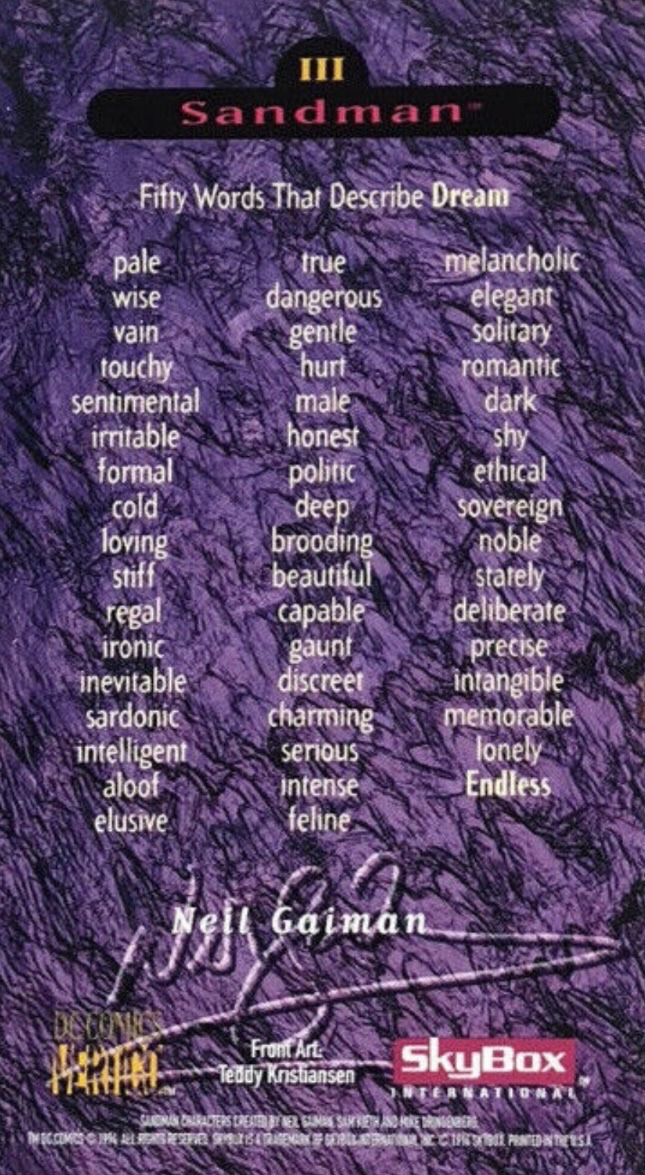
from: Vertigo Chase Card Set
So in short: This is probably the most accurate way to describe Dream in a nutshell, from the author himself, fully knowing that Murphy doesn’t lend himself well to be described in a nutshell.
And of course it’s absolutely fine if we want to head-canon him just being 5 out of those 50 (or none of them at all)—our stories are our own. At the end of the day, we went through a whole year of Tumblrfication (I might have made up that word), and getting back to the series will be tough. So is trying to align what the current prevalent perception of Dream is like in parts of the fandom, and what he is like in both comics and series (show and comics really aren’t that different where it matters, and I’ll die on that hill). I already worry about the fallout if I look at what happened with GO or OFMD, but that just as an aside.
Anyway, Dream in fandom spaces is often portrayed as either a pathetic wet cat who can’t get to grips with anything and constantly needs rescued in one way or another, or as a completely unfeeling arsehole incapable of relating to the human experience and being horrible all around. There are very few shades of grey in how some fans perceive him, when just the list of above adjectives shows us how complex he is as a character.
One thing that obviously comes up regularly are his relationships, be they romantic or platonic. So I just wanted to draw attention to the adjectives that relate strongly to the relational element in him (although they all apply in one way or another):
touchy, sentimental, cold, loving, [elusive], gentle, hurt, deep, intense, solitary, romantic, shy, intangible, lonely
Dream is the unreal. His way of loving relates very deeply to what stereotypical romantic love is: Romance and reality are a contradiction in terms—romanticism is dreaming because it is, at its very core, an idealised view. The intangible dream that comes back to bite us in the arse once reality sets in. And his flavour of love is the prototype of idealised and intangible (=romantic) and can never be anything else by his very nature.
And I’ve often thought that the way he experiences love is also a large part of why his existence is so difficult for him, and why he ultimately makes the choices he makes. Yes, he detests his function, but if he weren't so lonely (and weren't doomed to be so by his very purpose), he might find it easier to bear.
Let me look at, and draw parallels to, the 7 types of love as the Ancient Greeks perceived them [quick note about the image references: I would have loved to give more, but there is a limit. Also: Apologies I have no alt text for the comic panels at this point, I might add them at a later stage if I find the time]…
Eros
That’s both sexual and romantic love (to varying degrees), and it can be fleeting (like a dream) if not anchored in a less idealised view. So there’s your first cue—he totally experiences that kind of love.
The Ancient Greeks also thought it was a dangerous type of love, one that clouds our judgment and one that won’t last if not combined with some of the other types. And Dream himself knows this and probably relates (he detests his sibling Desire for “meddling”, after all). And yet, he is the intangible, the ungrounded, the unreal.
It’s all over every single one of his relationships we witness:
Killalla—“gifted” by Desire. We never get any cue as to what exactly they were up to, but it can be assumed desire, for whatever, played a large part in their relationship. Killalla makes no secret about it either (and is at the same time uncertain whether she truly loves him while being confused Dream might actually love her after what seems a very short time, at least in cosmic terms). Suffice it to say, he has a very idealised view of her and their relationship. Romantic idiocy at its best: He has literal stars in his eyes and is so grateful for Desire’s help he is basically kissing their boots in gratitude.
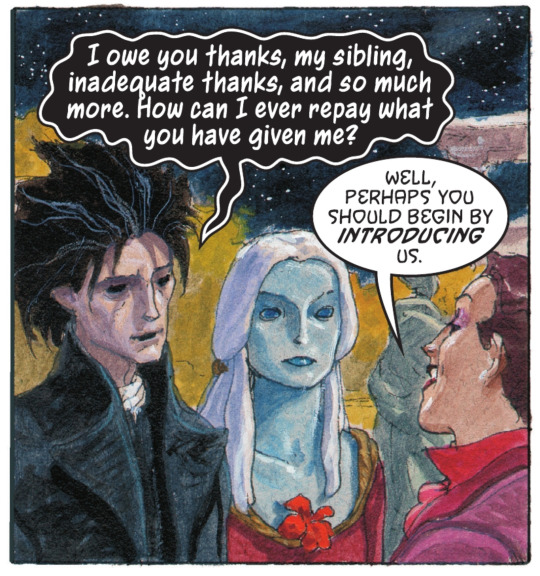
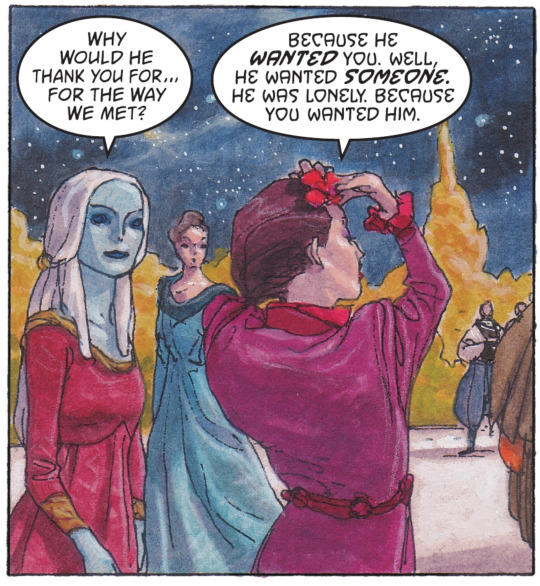
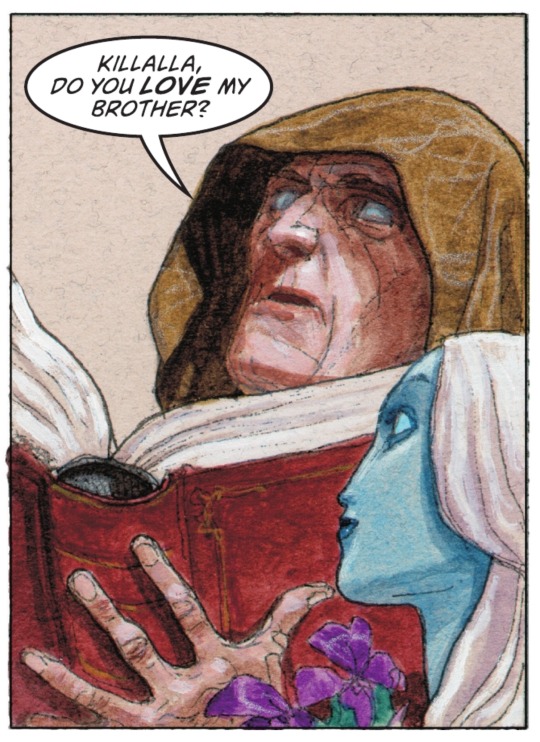
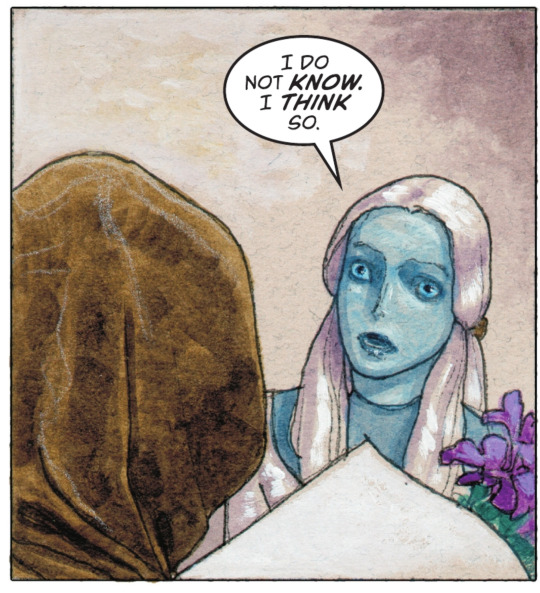
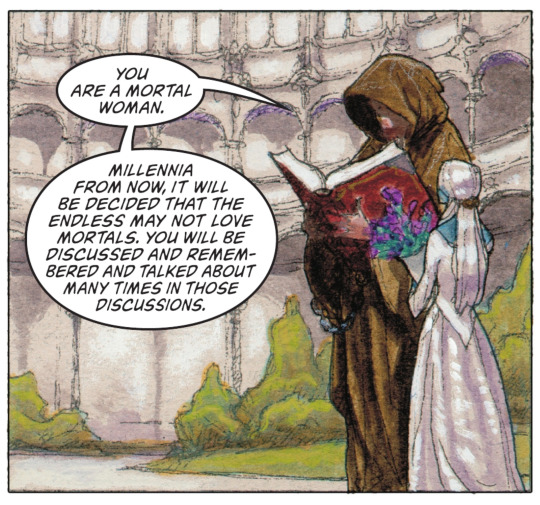
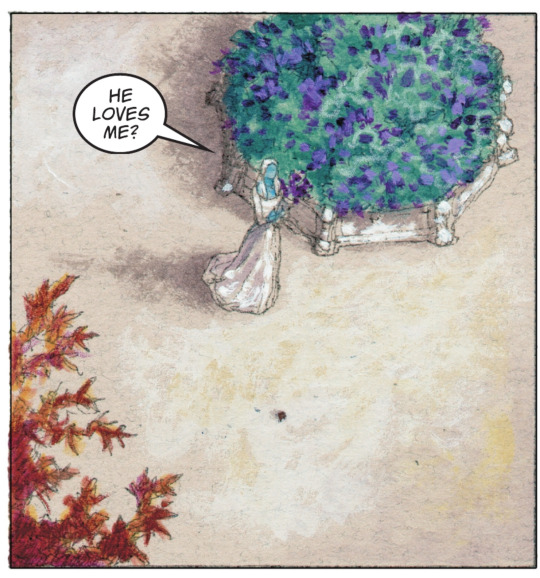
Alianora—again one of Desire’s gifts. And Dream tried, and I definitely think he was at least romantically (and physically) attracted to her (the art is very hard to interpret otherwise, neither is the context--she was gifted by Desire, after all). But this relationship is generally a tricky one because there is gratefulness and guilt n the mix, and that is sometimes a very unfortunate combination. He also couldn’t fully trust her because of his deep mistrust of D/desire. And lo and behold, of course the relationship soured when romantic and (potentially physical) attraction waned.
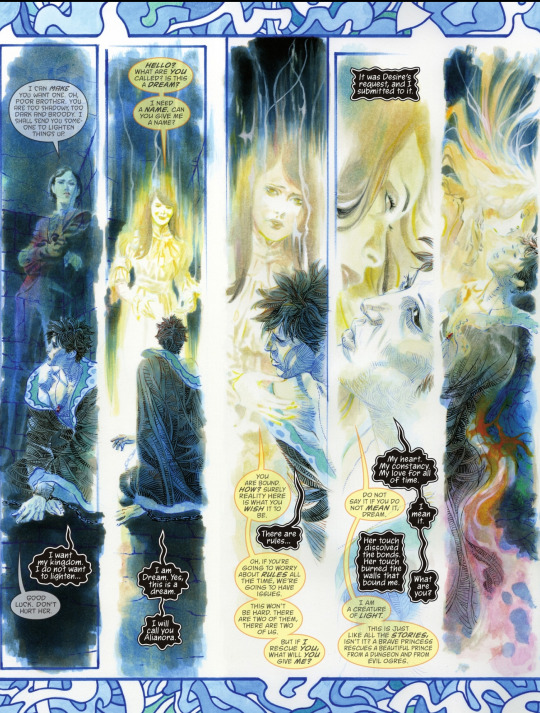
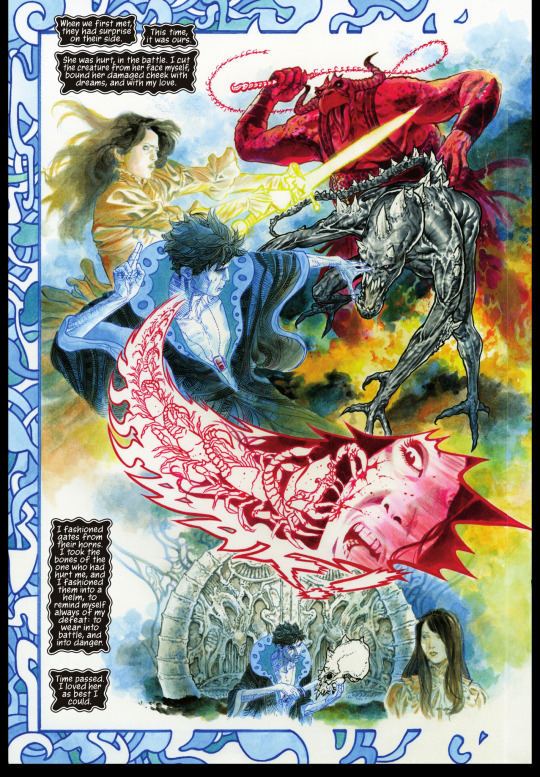

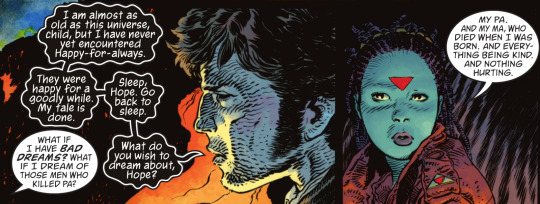
Nada—pursuing each other on and off, broadcasting sexy time all over the Dreaming because he's just so head over heels and literally bursting at the seams—need I say more? Yes, he does say to her that her body does not matter to him, which I 100% believe is true. He also says that he will love her as no mortal man can. But everything that transpires is still deeply informed by romantic attraction, because quite frankly: You don't feel love yet after you've barely met someone. It's again a deeply idealised view and that is something inherently romantic in tandem (in this case) with physical desire. Again, because D/desire was involved.
As to the particulars of Nada’s banishment to hell, and why Dream acted so out of character compared to his other failed relationships: You can find all of it here.
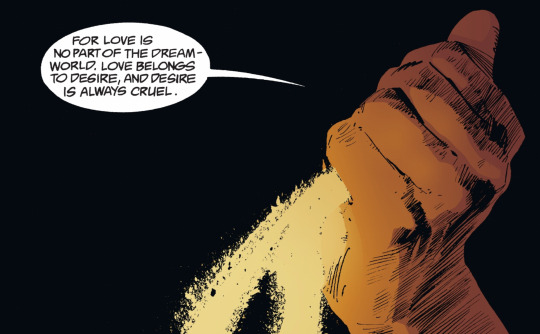
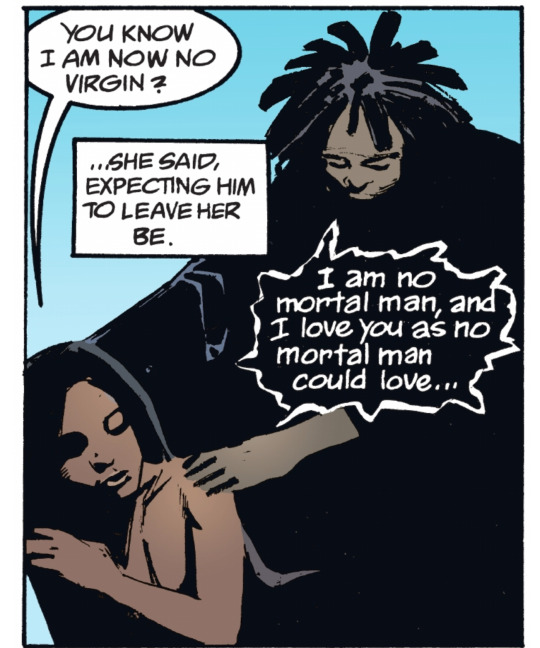
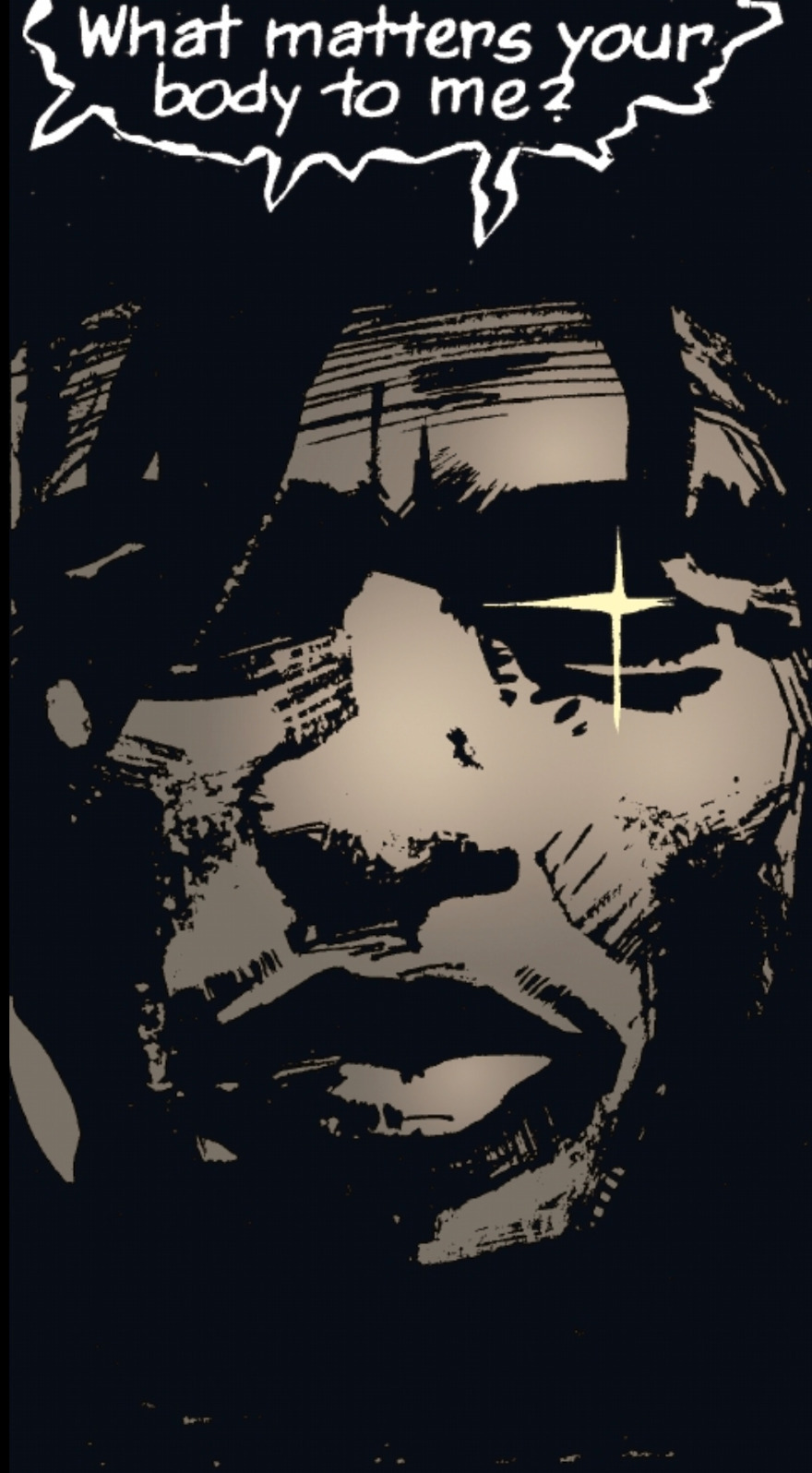
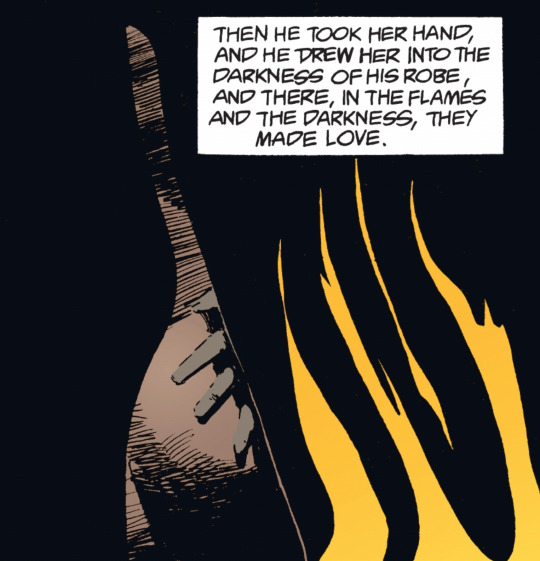
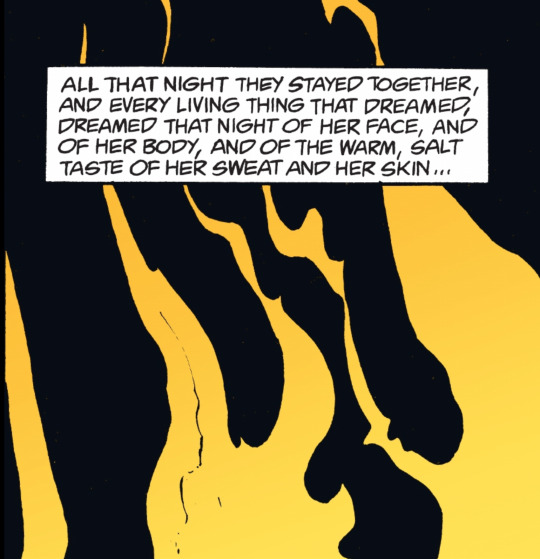
Calliope—read her speech at the Wake is all I’ll say. That is someone making romantic love so integral to their whole existence, I don’t even know where to start. He puts the world at her feet and makes sure she always comes first (quite literally) while they are still loved up…
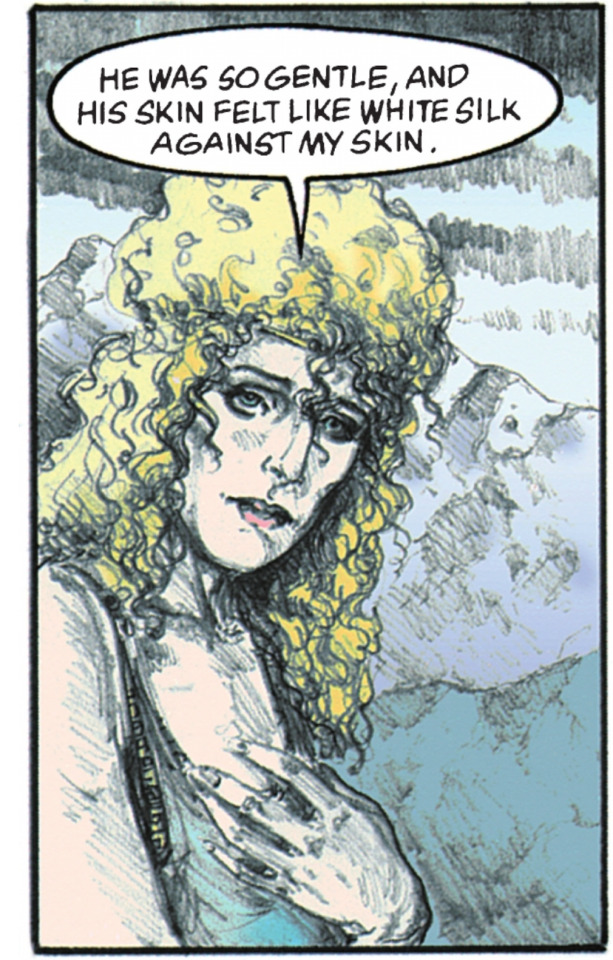
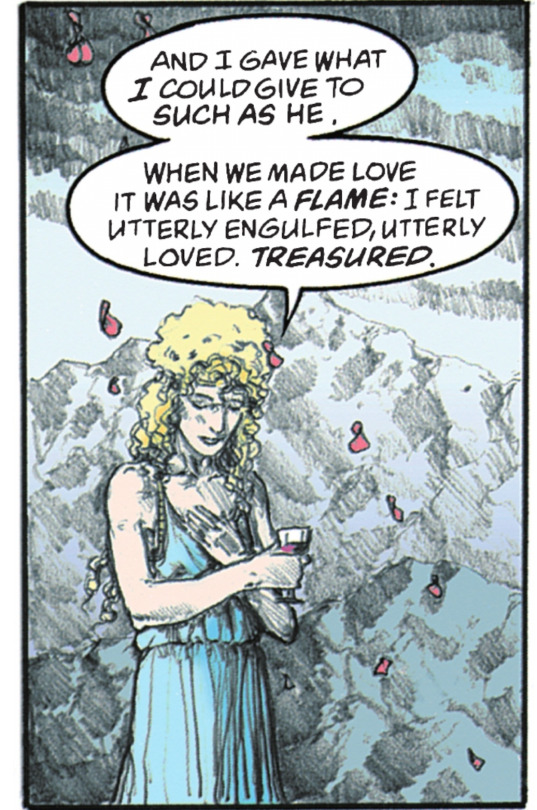
Thessaly—he's the romantic idiot (affectionately) in the rain with his coat billowing in the wind, and referring to her “weighing him dispassionately and finding him wanting”. It was only a handful of months--you don't feel true, stable love at that point. Again, it has the idealised view of romance (and potentially sexual desire) written all over it. He would have given her the world, just like he would have given the world to Nada and Calliope. That is the trope of every freaking romance novel, and that is exactly how he perceives love.
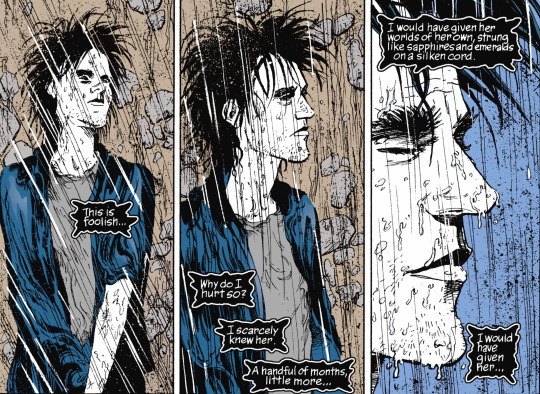
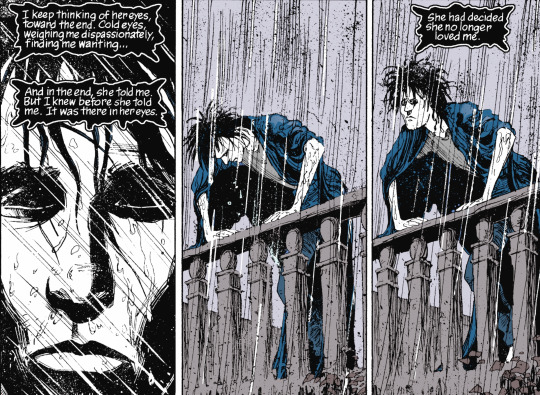
Titania—who knows, she keeps her mouth shut.
Ludus
I think he has a hard time to be flirtatious and playful (at least, we don't really see it. We never really see him during the courting stage, and what went down with Thessaly was hardly "flirtatious". `Then again, bickering like they did in A Game of You is electrifying to some, so who knows. She also said at his wake he was cautious and nervous). And if he comes across as flirtatious (there is a charming on that list of adjectives after all), it’s just because he is so deliberate in everything he does that he might just push someone’s (right) buttons, so to speak. But that’s not the same as “no strings attached”-love, because I honestly believe he’s incapable of experiencing love that way. There is no “casual” with him. He always stays attached to the people/women he once loved, even if the relationship sours. He still loves each and every single one of them, he never stops. But he also doesn’t in a way that’s sustainable, and it’s an unsolvable conflict due to what/who he is.
Philia
Most closely translated as friendship and affection. Platonic love, if you will. It is also a love between equals. He has a hard time with it and only slowly learns what it means through his relationship with Hob. Needless to say: The Ancient Greeks valued platonic love as one of the highest forms of love. Hence, I’m personally reluctant to turn it into something else/slant it towards romance, because that’s exactly what this part of the story is about: His relationship to Hob is important and grows/lasts because it is not romantic in the comics.
Storge
Unconditional love for family, especially children. Based on complete acceptance and potentially sacrifice. Doesn’t need to be reciprocated. You feel it, no matter what, and you act accordingly. And for Dream and Orpheus, that didn’t work until it did. Or, let’s rather say: I don’t want to assume he didn’t feel it. But he pushed it down in his hurt and pride (as did his son in his grief). No further comment, because that one hurts.
Agape
Altruistic, universal, all-encompassing. And that’s so deeply at the core of his being, and so central to his whole conflict that I don’t even know where to start. From not wanting to kill the first vortex (or Rose, for that matter), to telling John Dee he’s hurting the dreamers, and that being his main concern while he himself was writhing on the floor in agony, to “humanity I love you”, to a million other things. He cares so deeply, there is such a deep concern for sentient beings in their entirety that it’s quite literally impossible to call it anything other than love. And it’s also what plays a large part in his demise.
Pragma
Oh, here we go. I honestly believe he likes the idea of committed and long-lasting. And he’s trying. So very hard. Calliope is the best example. Alianora was another one, because it’s not like they broke up swiftly (hard to tell how long they lasted, but since she had stayed in the Dreaming too long to go anywhere else, it wouldn’t surprise me if we’re actually talking a very, very long time. He called it “a goodly while”, and considering how old he is, I doubt that equals only months, or even just a few years, especially since he is fully aware how short his relationship to Thessaly was). And he wanted to stay true to his promise. But he is who/what he is: the unreal. And as the personification of that, love both feels real for him but will also forever stay intangible. It’s heartbreaking really. Again, it has written the contradiction between romantic love (the ideal) and pragmatic love (the thing that is grounded in reality) written all over it.
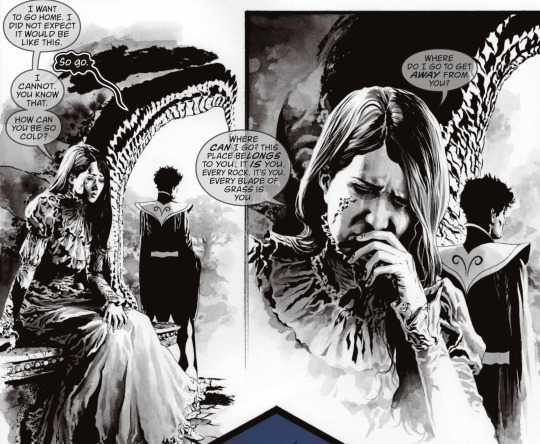
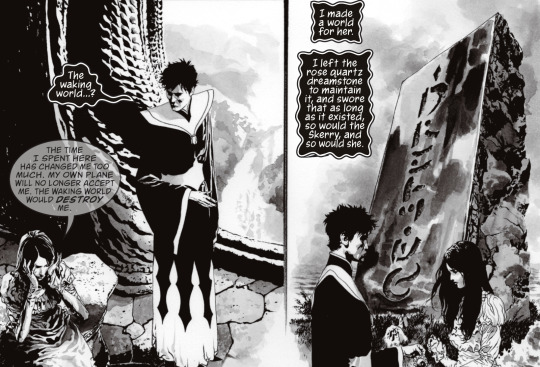
Philautia
And that’s the most heartbreaking one. He is incapable of self-love and full of self-loathing instead. The Ancient Greeks used to say that you can’t give what you don’t have. And it’s hard to feel compassion for the flaws we perceive in others if we don’t have that self-compassion for the exact same flaw in ourselves. And that one hurts in so many ways, from his not being able to forgive himself (which is mirrored in his relationship to Nada, who also couldn’t forgive herself—she didn’t need his forgiveness, she needed her own) to Orpheus being so much like him apart from one major difference: he’s mortal in spirit, and even immortality doesn’t change that. And Dream struggles with the part of his child that is so like him for a million reasons that would burst this meta at the seams, but again: it’s hard to love in others what we detest in ourselves, knowingly or unknowingly.
So in short: The particular flavours of love Dream feels (Eros, Agape, Philia growing slowly over time) and the ones he doesn’t (Ludus, Pragma, Philautia) are also at the very root of how the story goes.
And when he finally truly understands what Storge/unconditional love is--both in the way he reassesses his relationship to Nada but especially in how he finally submits to his love for Orpheus (with all that entails)--and when he allows it to become real, it’s what tightens the noose around his neck. But that noose has been around his neck loosely all along…
#the sandman#dream of the endless#morpheus#sandman#sandman meta#neil gaiman#the sandman meta#sandman bookclub#sandman book club#sandman spoilers#the sandman comics#hob gadling#the sandman netflix#nada sandman#orpheus sandman#calliope sandman#killalla of the glow#sandman alianora#desire of the endless#thessaly#morpheus and his doomed relationships#dream and how he feels love or doesn't
213 notes
·
View notes
Text
"Comic books are the authentic form of canon and you should stay faithful to them," okay but like you realize that's limiting!! You realize that official content is put in front of you to be analyzed and criticized and adapted in your individual form of enjoyment, otherwise its just fucking boring, right? You realize it's extremely rare for official content to be enjoyable when it's written by someone who doesn't understand a character because they like them, but because they have to appeal to popular trends and what sells best, right? You realize you don't possess some superior leverage over others just because you stick to that only, right? Right?
#i love a very good majority of comic book fans but some of you are simply repulsive to be around. your vibe stinks if#you fail to comprehend that you don't own the fandom space you participate in.#this is about#dc comics#bruce wayne#sorry if this comes across as slander its bc it is#text post#meta#do i think comics are inherently wrong? no. theres actually plenty of comics i read and gave a try to.#i do however have a big fucking problem with ppl who don't understand how frustrating it is to see a character you love be butchered#countless times and get shit for choosing to turn away from the medium that keeps butchering them#YOU'RE HERE TO HAVE FUN! FANDOM IS NOT A COURTROOM!
359 notes
·
View notes
Text
There’s this one line in the first issue of Watchmen. This line in Rorschach’s monologue- “On Friday Night, A comedian died in New York. Nobody Cares. Nobody cares but me.” And it is such a perfect encapsulation of everything good and bad about Rorschach, and about superheroes conceptually.
Yeah, Rorschach. Nobody does care. Nobody but you cares because everyone who even lightly knew this guy in a professional or personal capacity hates him. By almost every metric you can apply the world is better off without him in it- including by the metrics you apply, Rorschach, because if you were anywhere near as objective in your dispensation of justice as you think of yourself as, you’d have broken into his penthouse and done this yourself years ago. You are very pointedly the only person in the second issue who has no direct flashback involving a formative experience with The Comedian; your investment in him in pure projection. Dare I say, Rorschach-like.
And yet. Blake’s absolute scumminess isn’t why he was killed, was it? It isn’t why the cops are soft-pedalling the case (they claim that they’re afraid of getting Rorschach involved, but I’m personally more inclined to believe that the case just seemed Weird and Hard.) Blake’s death actually is the tip of a monstrous iceberg; Rorschach is completely correct in taking the killing as seriously as he does. But he can’t claim any special insight-it’s a broken clock situation, because he takes everything that seriously. And there’s an impulse to say that’s a good thing- except the fact that he only takes everything that seriously because he’s wrapped up in an insane, self-pitying, self-righteous self-image. It is important to him, that he is the only one who cares about this, because it gives him ground to disdain everyone else who doesn’t.
But at the end of the day, no matter how you arrive at it, the concept of solving every murder- of no death going unresolved, of no murder, of anyone, going uninvestigated- is, full stop, aspirational. It is a good thing to want and a good thing to work towards. And Rorschach, for all his insanity, is actually making some degree of headway. He very pointedly immediately figures out the hidden compartment holding Blake’s costume after being in the apartment for seconds; the cops talked in circles for several minutes and didn’t pick up on the discrepancy. He blunders down false trails, he engages in completely unhelpful violence that stood absolutely no chance of advancing the case, simply because he’s inclined to violence; and he pursues the mask-killer theory above all others because it flatters his self-image, his self-importance, his self-appointed role as the last cowboy. But I suspect that Ozymandias wouldn’t have bothered feeding the fire on the Mask-killer theory if there wasn’t a risk of Rorschach eventually figuring it out what was really going on. He got closer than anyone else just by virtue of trying at all.
Rorschach is the fantasy of someone, somewhere, Being On The Case, whatever the case may be; however tempting it may be to ignore The Case. Someone who cares, someone who’ll fight tooth and nail to get answers that absolutely should be gotten at. But he’s also the dark side of that- an examination of the kind of neurotic who would care, always, about all of it, the ways in which the caring would need to flatter and feed his ego to be sustainable, and the sheer amount of collateral damage all that caring would do to anyone the neurotic considered the cause of the problems he cares about. Here’s the price of a crusader who’ll stop at nothing- you’re stuck with a crusader who’ll stop at nothing. That is not a quality that exists in a vacuum. That is simply not the kind of nice idea you get to have, without an eye for how a person gets that way, how they stay that way, and how much damage they do.
2K notes
·
View notes
Text
One thing I love about Kingdom Hearts, and that has only made me love it more as the years go on, is how genuine and true to itself it is. It doesn't lack confidence in itself, it presents itself to you wholeheartedly and asks you to take the story it's telling seriously.
Kingdom Hearts doesn't feel the need to constantly justify itself with meta jokes and commentary. It doesn't take every opportunity to point out how wacky these adventures and characters are - it expects you to go in with a suspension of disbelief and enjoy the ride.
Meta humour has become more and more common, and don't get me wrong, it has its place. KH isn't COMPLETELY lacking in it. It *can* be funny and insightful. But most of the time, it's not. It just feels like franchises being insecure and poking fun at themselves to fit in.
I want more series to come at audiences unapologetically with their premise, however silly it may at first seem, and say "This is the story we're telling. This is what we're doing, and if you're into it, follow along. If you're not, there are other stories out there."
#kingdom hearts#kh#meta humor#looking at you MCU#peter laughing at otto's name was dumb#accept the silly names#you're a fucking comic book franchise
431 notes
·
View notes
Text
What we learned from the war
"Endings are hard" is a something of a truism, but it's borne out in Bleach, where every story arc besides after the first two stumbled at the finish (even the endings of the first two arcs don't really "end" so much as continue into a new story). In the Arrancar arc, the number of characters and plotlines got so overwhelming that an ending that had to be rushed if it was to arrive at all. In the Lost Agent arc, the characters were pared down, but the ending wound up thematically inconsistent with the story anyways, possibly due to real-life circumstances. And the Thousand-Year Blood War somehow managed to have both problems.
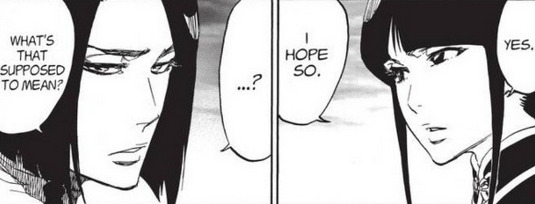
The change in direction from "tightly focused character drama" to "sprawling cast of soldiers" meant that it was unlikely to ever give us the development of our protagonist that we craved, and that lack of focus was only aggravated by the widely-reported health problems of the author. And yet, perhaps because we don't get that, because so little of this arc is filtered through Ichigo learning about himself, we get a much clearer statement of the values inherent in the work.

This is most evident in our antagonists for this Arc. Yhwach and the Wandenreich don't really have the relationship with Ichigo that previoius antagonists had. He never knew his Quincy heritage, never identified with their ideals, and so feels very little conflict about opposing them. He doesn't ever develop his Quincy powers, at least beyond integrating them with his already existing powerset. And he doesn't take much of a personal interest in Yhwach, who in turn, doesn't seem to think much of him when he's not directly in front of him.

But for all that Ichigo doesn't end up having much of a dynamic with them, the Wandenreich still manages to maintain a unique character. Every antagonist has a priority, something that they are willing to do great evil for. For Soul Society, it's its own existence, the continuation of the system they've built. For Aizen, it's his own self-aggrandizement. For the Fullbringers, it was simply living another day, screwing over others so that they can't screw you first. But the Wandenreich has no such priority. They simply want it all to end.
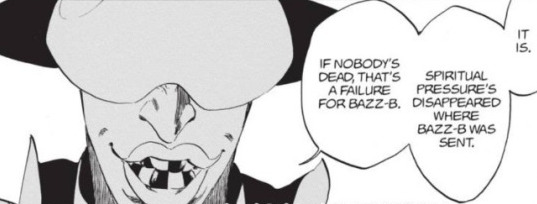
That's most obvious in Yhwach's ending monologue, but you can see it from the very beginning as he kills Yamamoto, the man who tried to move on from his bloody past being slaughtered by the man who would absolutely not let it go. Yhwach shows more emotion towards the skeletons of Argola and Huberdt, his dead soldiers from a war long lost, than he does towards any of his living subordinates. And his subordinates follow his lead in showing no love to one another, happily stabbing each other in the back without even the Arrancars' uneasy level of camaraderie. Their movement has no future, and neither do they, so nihilism is the only recourse.

Most of the time. I think it's important to note that every time a member of the Wandenreich expresses positive feelings towards one of their comrades, it's immediately followed by them turning on Yhwach. Liltotto, Bazz, Giselle, eventually, in her own twisted way…even Jugram, at the very end. Sure, Yhwach kills them for their impertinence (he is the bad guy), but he also massacres the Wandenreich faithful en masse. There's no salvation, only death, and he'll enforce that state on his followers rather than allow them to discover any alternative.

I imagine the lesson, and the general attitude of the Wandenreich, was not lost on Uryu Ishida. Even in his relative paucity of appearances, it's he who is at the moral center of the arc. His culture, which he had thought was nearly entirely dead, turns out to be alive, and out for vengeance against the people who exterminated them. It's something he probably fantasized about growing up, and I don't blame him for joining. How could he not?
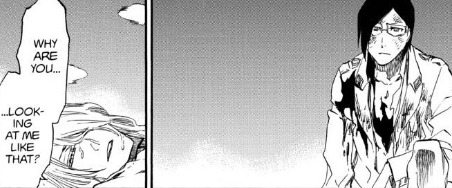
But at the end, he makes the very easy choice. Calling it a matter of "life and death" is a little on the nose, but it's morally quite black and white. Yhwach has no hope for this world, or for his people within it, or even himself. He lost a war for the nature of existence to a monster a thousand years ago, and never got over it. But Uryu has the strength to look at the horrors of this world and yet hope for better. Because he has people he loves in life, and who love him in return, he can dream of a better tomorrow.
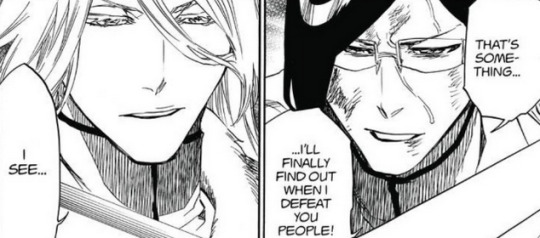
And that's what the ending is all about. Yhwach loses to Ichigo, and it is very much "good guy beats bad guy". But he also loses to Uryu, and to "I hope to have a family with my girlfriend who I love so much" Renji Abarai, and to "I have a tremendous amount of hope to eventually make myself king of everything" Sosuke Aizen, and eventually (in a way I'm still confused about mechanically) to the child Ichigo and Orihime will eventually have, the literal embodiment of the potential of the future.
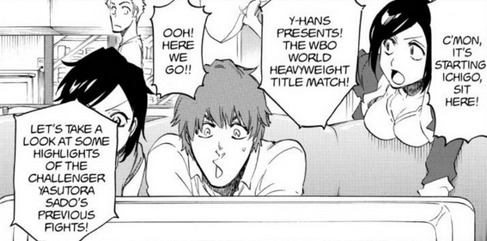
The final villain of Bleach is not society's tendency to preserve itself at any human cost. It's not individual selfishness, or manipulativeness, or any of the many vices we saw embodied in the hollows throughout the series. It's despair, the idea that life might not be worth living even through all the struggles and horrors our protagonists have endured. Sure, it will always raise its head, sometimes at the most inconvenient, or ill-fitting times. But having its reincarnation be blown away by the supernaturally normal lives of our cast…well, that's as clear of a message as I can imagine.
#bleach#troius reads bleach#bleach meta#this turned out way more positive than I thought it would?#I dunno I guess I just think “choose life” is a pretty great message for a comic book aimed at teenagers#who would have thought the Wandenreich would win me over in the end#even if I still think their aesthetic is kinda silly
62 notes
·
View notes
Text
In 2020, a Rayman comic series was pitched, where Rayman warps into many different game dimensions, then teams up with various Ubisoft heroes. Sadly, the project was cancelled because Ubisoft sucks!
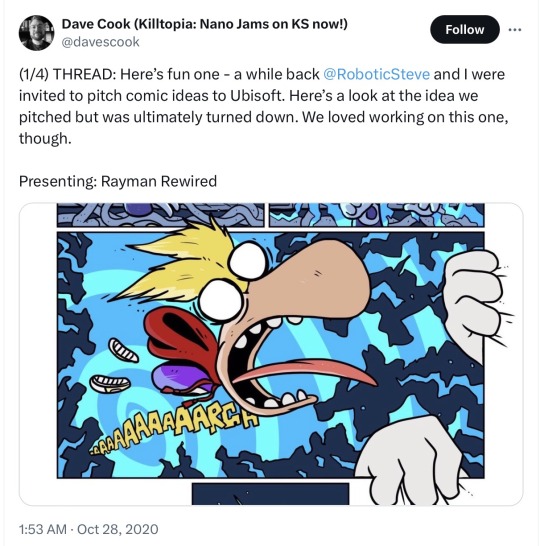
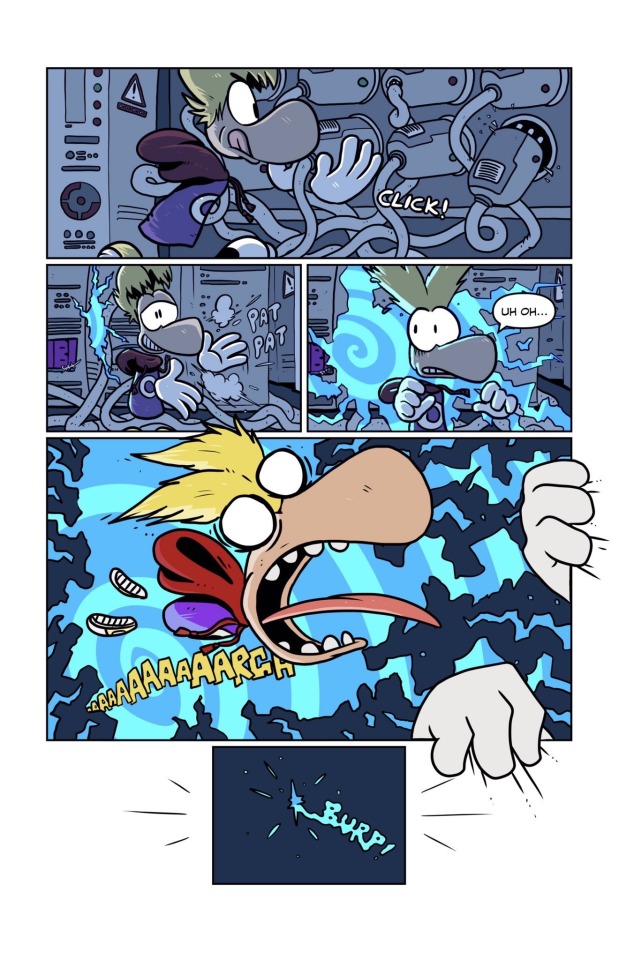
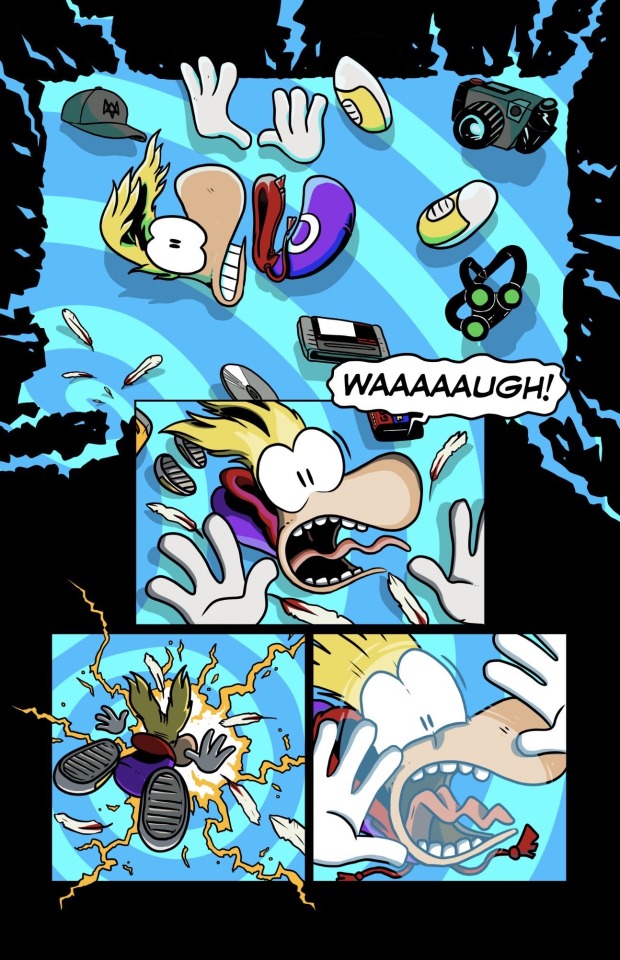
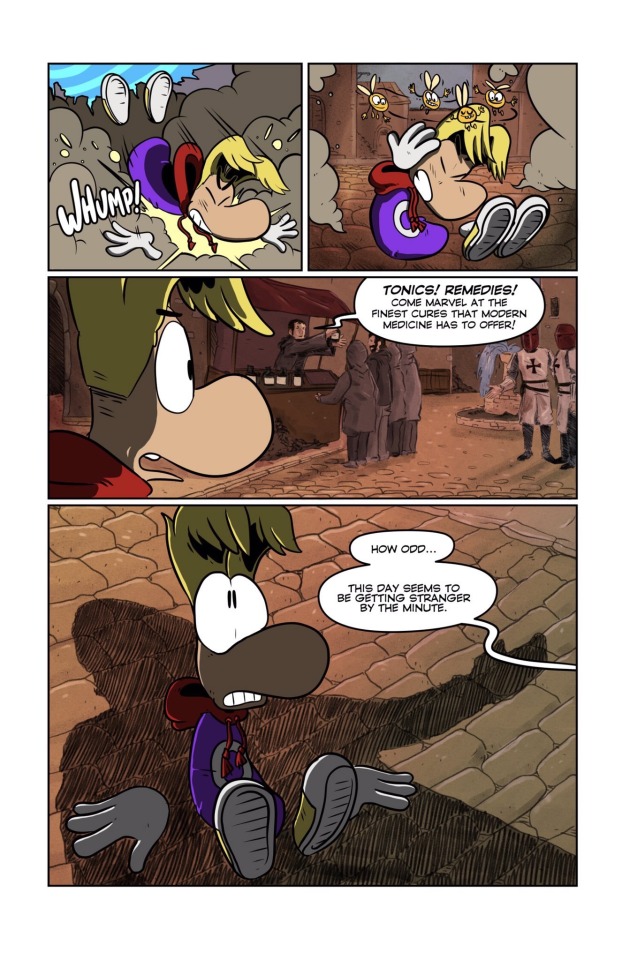

48 notes
·
View notes
Text
All I’m saying is Dick could have been a much better friend to Roy in Outsiders (2003). I haven’t finished it yet so maybe Dick gets his shit together but I doubt it. I mean he pulled a gun on him right after he recovered from taking 5 rounds to the chest and then threw Roy’s drug addiction in his face because Dick was mad. I’m glad Roy clocked him.
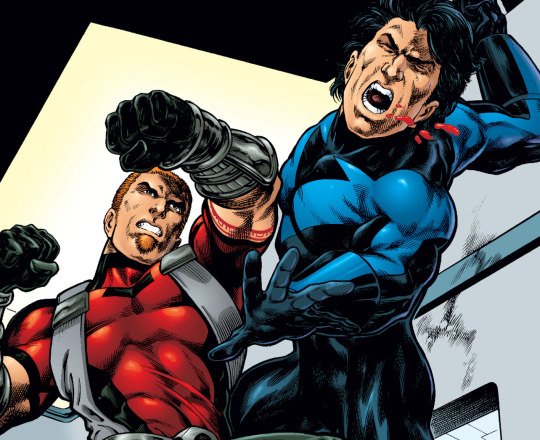
22 notes
·
View notes
Note
hey! huge fan of the blog! however, given the situation with Twitter or whatever it is called now I don't really feel like making an account which kinda prevents me from reading the full comic. is there any other site for it? if not, no problem, I still adore the shenanigans I'm able to access here!

It's pretty unfortunate news, but luckily Walter, Vince and the Himbro's shenanigans live on in one compact carrd and then some!
Here's a list of links if you wanna see some gay werewolf jocks x vampire nerds, buff freaks in haunted mansions, vampiric stepbro incense or hunky pinoy la creaturas.
#booghowart#meta#wav ask#carrd#links#furry art#walter and vince#anthro art#short comics#commissions#jonadio#freaky delivery 2022#Tabi Tabi po#red book one
103 notes
·
View notes
Text
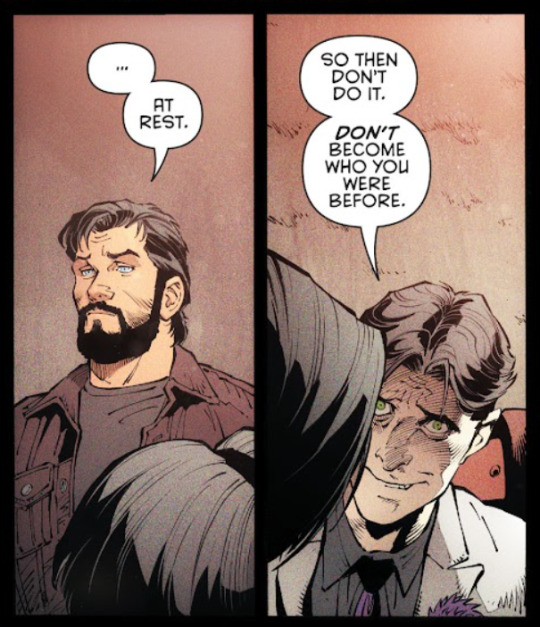
I’ve always found this interaction in Batman Superheavy between amnesia Bruce and our supposed Retired Joker to be so interesting as well as gut wrenching. DC’s choice to show us what both of these men could have been like without the trauma that made them what they are only to throw both of them right back into the bitter, harsh reality of their defined purpose in Gotham, somehow left me feeling like it was a cop out. There was never a happy ending for Joker, even in his ‘retirement’ he was ready to commit suicide and there was never a happy ending for Bruce either because the city would always find a way to make him Batman. No matter what happens to either of them, they can’t survive without the other and will always find ways to come back to each other. Even in his sanity Joker couldn’t stop himself from speaking to Bruce. It’s why I find this scene so confusing, why Joker wouldn’t want Bruce to become Batman again, so much so that he begs him not to. When Jokers actions, the gun, tell us a completely different story. They tell us that he misses Batman, he misses their dance. So why beg for the opposite of what you want?
#gig's comic search#gig’s joker takes#joker#dc joker#dc universe#comic books#the joker#joker comics#joker meme#batman comics#dc batman#Batjokes#joker meta#comics#amnesia bruce#retired joker
661 notes
·
View notes
Note
Hello, I really enjoy the superheroes and fascism discussion. I have read a couple of essays supporting the idea that they are indeed like akin to fascism, but none that support otherwise. Could you maybe recommend some? I find your points very compelling :)
Sure can!
"Captain America and Wonder Woman, Anti-Fascist Heroes"
"Art Spiegelman: golden age superheroes were shaped by the rise of fascism"
"Putting Anti-Fascism Back into Comics"
"8 Ways Comic Book Legend Jack Kirby Fought Fascism"
"Superhero Films: A Fascist National Complex or Exemplars of Moral Virtue?"
"Stop Calling Superheroes 'Fascist'"
"(Anti)Fascism and Superhero Comics"
"American Daredevil: Comics, Communism and the Battles of Lev Gleason"
35 notes
·
View notes
Text
i’m having thoughts about batman vs green arrow, and how the central characters shape the stories their supporting casts are allowed
like, in batman comics, bruce’s story is about being permanently shaped by a grief he can never move on from (his parent’s deaths, and later jason’s death). the premise of batman, bruce’s unyielding dedication to his mission, requires that bruce always be living in the shadow of his formative trauma, always responding to it. structurally, he can never be allowed to heal (because a happy bruce wayne isn’t batman), which means he can’t really grow. his supporting cast can develop and grow in their own right, but they can’t leave (bc they’re batman characters), so they stay stuck in the same unhealthy dynamics with bruce. this creates a narrative paradigm where positive change rarely sticks, cycles aren’t broken, and the easiest story to tell is a tragedy. bruce isn’t allowed a happy ending, so nobody who loves him gets one either.
now compare this with green arrow, where ollie’s stories are so often about having the humility, courage, and determination to take accountability for your mistakes and change for the better. transformative change is his whole deal! it’s the point of the island! and his relationships with his supporting cast reflect this. ollie messes up, he learns from it, and his relationships with other characters develop and improve accordingly. the point of the story is that ollie changes, making change possible for everyone. and so green arrow books present a paradigm where characters are allowed to grow in ways that stick, where harm can be learned from instead of brushed aside, and where happy endings aren’t guaranteed but do largely feel possible. yk?
#is this even anything? idfk#apologies to arrow fans if i’m off base. i’m still pretty early in my ga reading but this is what i’ve gathered so far#this is a pessimistic take on batman but like. my favorite character is dick grayson so can you really blame me?#this is why batman comics accidentally do such a good job depicting the cyclical nature of abuse#bruce isn’t allowed to heal so he keeps hurting his kids in the same ways#and his kids can’t set boundaries that stick bc they have to come back and be his supporting cast again#bam! inescapable toxic family dynamics!#dick’s case is the most tragic to me on a meta-narrative level#because he’s a major character in his own right so he sometimes escapes being bruce’s supporting cast (and thus bruce’s abuse) for a bit#either as nightwing or in titans books#but he was bruce’s sidekick for irl decades and he'll never fully be allowed to break free#dc#bat tag#arrow tag#ollie queen#oliver queen#green arrow#dc meta#mine: dc#not main tagging this with bruce or batman bc that's hitting the hornets nest lets be real.#and anyways this is for ollie fans and my dick grayson tragedy enjoyer mutuals
23 notes
·
View notes
Text
About Love As The Catalyst For Change
Okay, so while I was going through all the panels for March Mania, I also stumbled over these ones again:
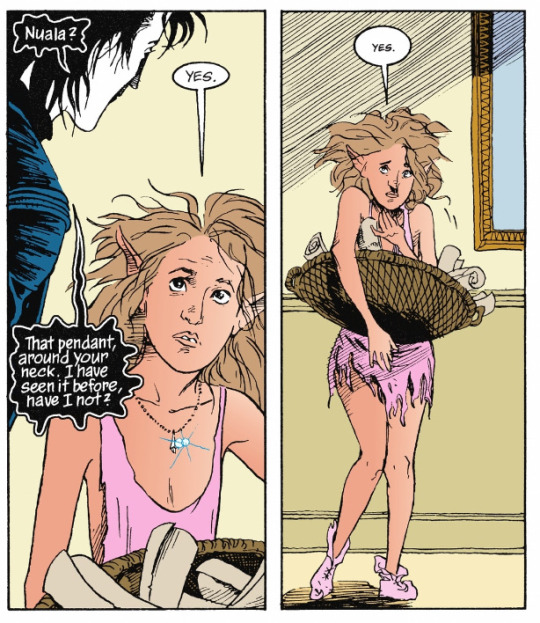
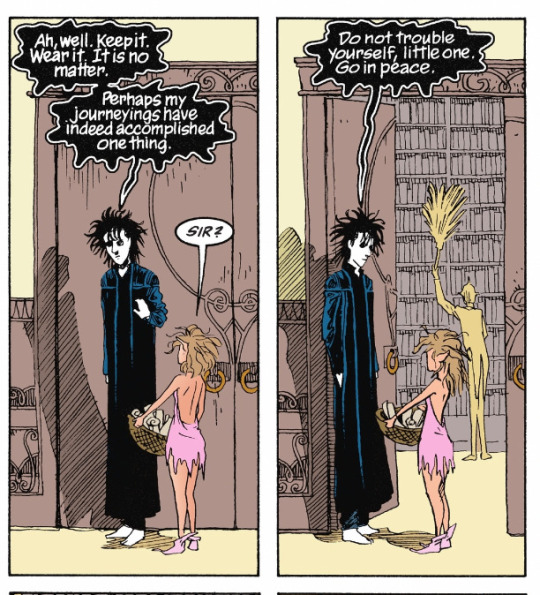
And although I’ve read it all a million times and had all these feelings before, I just need to blurt them out:
Love Is What Changes Him
It’s such a central message of The Sandman, but I feel it often gets lost in a million other things. And they’re all important, but so is this one.
Because yes, Dream went with Delirium and found Destruction (and Despair found him btw), and his Destiny was Death. And that whole Desire thing… ‘nuff said. BUT… (major spoilers ahead)
Those panels above are basically the turning point in a nutshell. No, well, the turning point is actually the moment he kisses (and then kills) Orpheus, but those panels are the essence:
He set out with Delirium in hopes to find Thessaly (the pendant Nuala wears here used to be hers, and she gave it to her when she left the Dreaming and him. And I can’t even begin to tell you how I feel about him letting Nuala keep a gift of his ex, who betrays him later by protecting the woman he hurt, and then making it the item that holds the power with which Nuala can call in her boon. One could spin that very far in all sorts of different directions).
But when he comes back after killing Orpheus, it doesn’t really matter anymore. Thessaly was the usual romanticised dream that could never be real. But he finally did find love. For his son. The unconditional kind. The one that doesn’t need anything in return because it just is. And he was loved back, if for a brief moment. But it was real, not a dream. And that love stays real (that’s why it initiates the turn, 3rd act and all that).
I’m reminded again of the words of Frank McConnell in his intro to The Kindly Ones:
“And with [killing Orpheus], Dream has entered time, choice, guilt and regret—has entered the sphere of the human.”
(Side note at this point: With all of this in mind, read Dream Hunters [again], and look at all THREE main characters—that includes the onmyōji, not just the monk and the fox.)
And it would be so easy to say, “Well, love killed him then, what’s the fucking point?” Not just the love for his son, but also the love of a maiden who called in her boon (Nuala), the love of a mother for her child (Lyta), the love of a crone for no one but herself (Thessaly).
But we all know that “change or die” was never an “either or”, because it’s an “and both”. And it’s ultimately love, in all its shapes and forms, four times over, that changed him (while it was also part of the death knell, but that’s a complicated one. In any case, it also led to change: To be(come) a new, better, kinder Dream).
Yes, call me romantic or hopeless (although I think that’s the wrong word in this context, because I feel it’s the opposite), I don’t care.
Because that story is about catharsis. And that means Dream is a vessel for our feelings. And the feelings won’t be the same if we change any of this, for better, for worse. Because truthfully: That story is about me. And you. And you.
About allowing love, of whatever kind (this is very clearly not just about romantic love), to change us. And that ultimately means letting go (of control). Just like he did.
Bleurgh, I’m crying. Catharsis 🤣
#the sandman#sandman#neil gaiman#dream of the endless#morpheus#daniel!dream#sandman meta#sort of because it’s a bit feely#and shortish and without a million references#but I’ve brought them several times#in my pinned post#sandman analysis#sandman character analysis#the sandman comics#nuala of the faerie#lyta hall#Thessaly#orpheus sandman#love changes#tragedy#catharsis#sandman spoilers#the sandman spoilers#sandman book club#sandman bookclub
101 notes
·
View notes
Text
My brain is a mess atm so I'm gonna try to keep this as cohesive as possible but god. I saw Across the Spiderverse for the second time yesterday night and I had completely forgotten the opening with the Comics Code Authority seal. My first time watching me and my friends laughed at that scene, "Haha lmao they're spoofing on the comics code authority a bit, hell yeah" I had thought, and I moved on to the masterpiece that was ATSP. The second time though, after knowing all the themes and ideas of the movie, the comics code seal hit me like a truck. Because Miles's story could NEVER be approved by the comics code. Neither could Pavitr's, nor Gwen's and definitely not Hobie's for that matter. And this ties back exactly to the themes of the movie because Miles's story is about rejecting conventional storytelling and the norms of what a Spiderman story should be. In the same way that Miguel is so obsessed with maintaining canon, maintaining the status quo of the Spiderman mythos, the entire point of the comics code was to restrict stories with new perspectives that didn't fit a certain agenda. It was when comics were able to break free from the code that we got so much innovation and diversity and complexity. And I know that morally Miguel and the Comics Code are definitely not a 1 to 1 comparison but in a meta sense, viewing ATSV's themes as a commentary on storytelling conventions, it fits perfectly I think.
#i fuckingn. love this movie#any piece of fiction that poses a meta commentary on storytelling norms and breaks through those norms is a masterpiece in my book#i think this is part of why i enjoyed atsv more than itsv#i just have a soft spot for it#across the spiderverse#spiderman across the spiderverse#spiderverse#comics code authority#miles morales#spiderman into the spiderverse#textpost#teatime ramblings
110 notes
·
View notes
Text
Reference to Poison Ivy's current run?
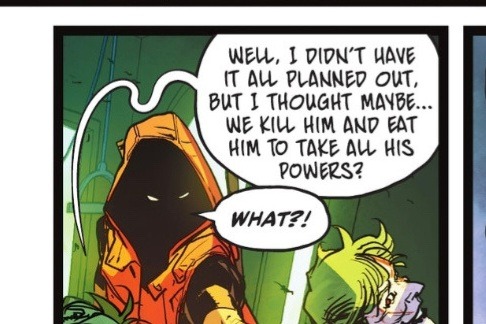
#dc#dc comics#comics#comic books#joker the man who stopped laughing#the joker#jason todd#red hood#poison ivy#dr pamela isley#jason woodrue#floronic man#comic panels#meta#media analysis#parallels#jason peter todd#pamela lillian isley#funny#character parallels#character dynamics#matthew rosenberg#g willow wilson#poison ivy 2022
39 notes
·
View notes